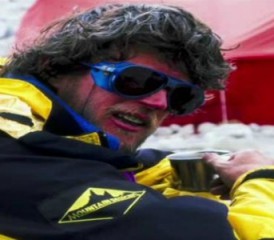Famed Australian Mountain Climber Lincoln Hall Dies of Mesothelioma

Lincoln Hall defied the odds many times as a famed mountain climber and fearless adventurer, but he could not escape the steely grasp of mesothelioma. He died earlier this week in a Sydney, Australia hospital at age 56.
Hall was best known for his remarkable, well-chronicled survival on Mount Everest in 2006 when he was left for dead, even pronounced dead, but returned to tell his story and climb again.
“He had an air of invincibility about him on the mountain. He was a terrific climber, an amazing human being. He cheated death,” Simon Balderstone, a good friend and fellow-climber, told the Sydney Morning Herald. “But I guess now you have to admit he’s not invincible. This is a horrible disease.”
Hall was diagnosed in 2011 with mesothelioma, the cancer caused almost exclusively by an exposure to asbestos, the toxic, naturally-occurring mineral.
Hall and his family recently completed an asbestos compensation claim in Australia that traced his exposure to his childhood. He had helped his father in 1966 build two cubby houses on the family property using flat sheets of asbestos cement.
The latency period between exposure and diagnosis is not unusual. It often takes between 10 and 50 years after exposure before symptoms become obvious. And by then, the cancer already has spread.
Although mesothelioma is a rare cancer, affecting an estimated 3,000 Americans each year, he is one of several well-known people who have died from the disease.
Others include Merlin Olson, NFL star and actor; Steve McQueen, actor; Warren Zevon, musician; Hamilton Jordan, White House chief of staff; and Terry McCann, Olympic gold medalist.
Hall was a member of the first Australian Everest Expedition in 1984. In 2002 he started and directed the Australian Himalayan Foundation, which helped impoverished communities near the mountains that he loved. He was named the Australian Geographic Society’s Lifetime of Adventure recipient in 2010.
He was the author of several books, including Life as an Explorer and First Ascent. His autobiography, Dead Lucky, was published in 2007, detailing his infamous Mount Everest climb from the year before.
It was shortly after reaching the summit of the world’s highest mountain, 8,848 meters above sea level, that Hall lost consciousness on his descent and was abandoned by two co-climbers who also had run out of oxygen, and later reported his death.
He miraculously survived a sub-freezing night, discovered the next day half-clothed and hallucinating by a British climbing team that rescued him. He lost the tips of his fingers and a toe from frostbite, but he never lost his love for the mountain.
His rescue had come just days after the death of British climber David Sharp, who had perished not far from where Hall was discovered. During a television interview later, he described his love of the climb.
“It’s the intensity of the experience, at a sustained level,” he said. “The experience is incredibly intense because it is so dangerous.”